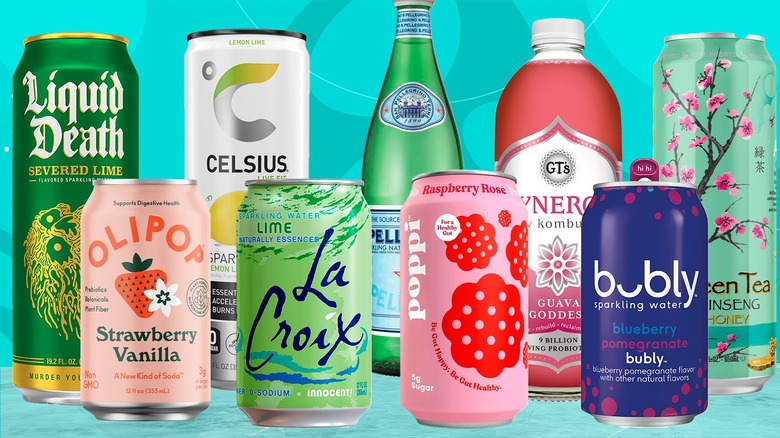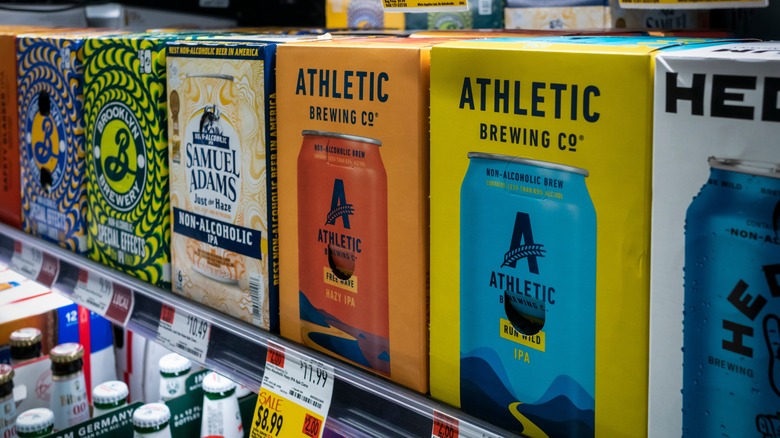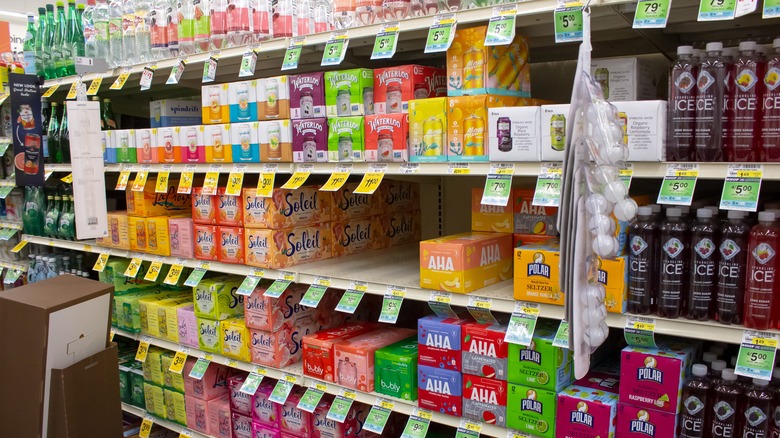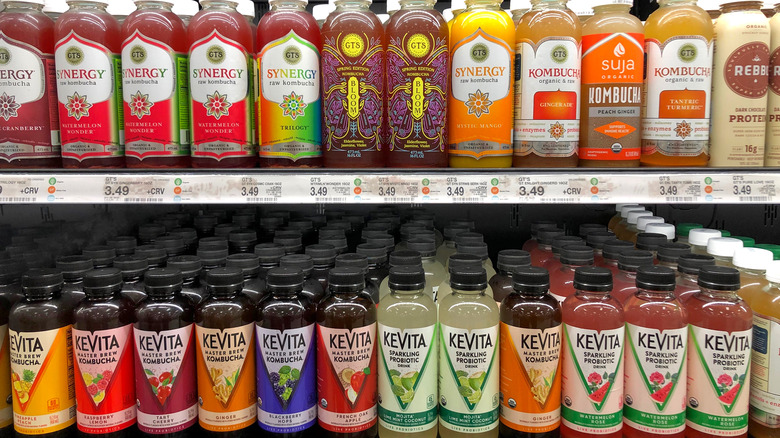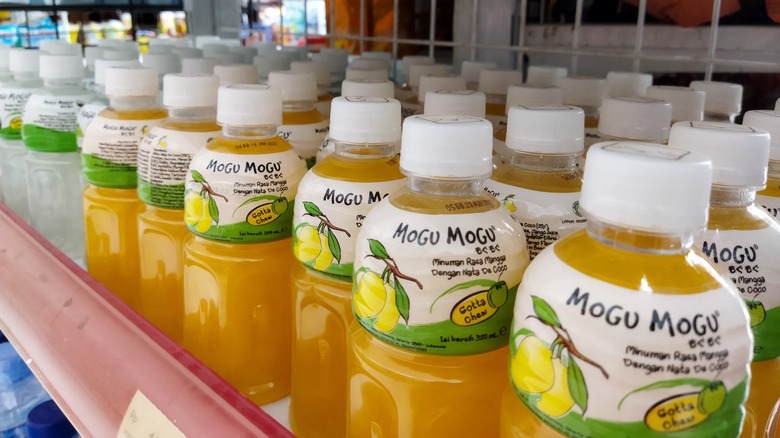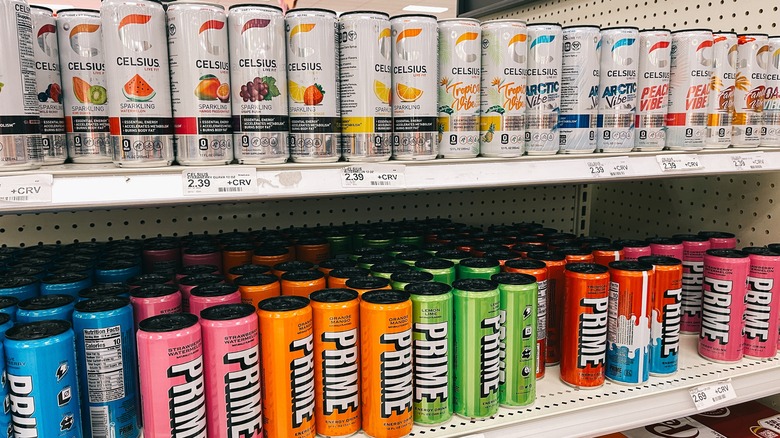How The Drink Aisle Became The Best Spot In The Grocery Store
Who would've thought that, in an effort to drink less, we'd be given more beverage options than ever? Alcohol and soda consumption are down, while America's health awareness is up, paving the way for a rise in non-alcoholic, wellness-centric beverages you'll find overflowing the shelves of your local grocery store. From sparkling waters that count the number of fresh lemons squeezed into each can, to fermented sodas infused with herbs influenced by Chinese medicine, the drink aisle is arguably the most innovative lane in the entire store.
A big reason for this is that younger generations are drinking less and less booze. While there is one type of alcohol that they pour more than others, a World Finance report shows that Gen Z drinks an average of 20% less (per capita) than millennials, who were already consuming less alcohol than the generations that came before them. Major driving factors include a rise in conscious consumption, as well as an increased awareness around mental health and the hazardous impacts that alcohol can have on it and the body.
Similarly, a 2021 study showed that younger people are also drinking less soda and sweetened sports drinks. With later generations leading the way, people are increasingly becoming more and more mindful of what they consume, in terms of both food and drink. So what does that mean for the beverage industry? Let's take a walk through the drink aisle so you can see for yourself.
People are drinking less, and there are more non-alcoholic options than ever
From low to no ABV, the rise in alcohol-free cocktails or "mocktails" only goes to show how much people aren't drinking booze these days — and we've sure come a long way from the one that started it all, the shirley temple. Many attribute this trend to the pandemic, a period where drinking establishments were closed and social drinking was muted, forcing people to think more critically about their relationships to alcohol.
Coming out of the pandemic, a lot of those relationships remained permanently changed. The grocery store drink aisle only goes to show that, serving as a one-stop shop for enjoying non-alcoholic versions of popular cocktails at home. Flavored waters and fruit drinks have always been alcohol-free, but that's not what we're talking about here. What you'll find in the drink aisle today are actual non-alcoholic spirits and hand-crafted drinks. Some of them stand in their own category and should be appreciated that way, while others are intended to replicate the flavor of common alcoholic drinks.
In the first category are brands like Seedlip, which is said to be the first non-alcoholic spirit on the market. The bottles are sold at liquor stores and supermarkets alike, along with other brands like Wilderton Spirits. You'll also find spirits that fall into the latter category, like Almave's non-alcoholic tequila, Ghia's non-alcoholic aperitif, Athletic Brewing's selection of non-alcoholic beer, and Spiritless, which makes an impressive non-alcoholic whiskey.
Water is no longer just water — and it's bubblier than ever
Water isn't just water anymore. It's something more entirely — and people are drinking more and more of it. And not just as a boring soda replacement, but as a beverage to be savored in its own right. Not only can you find uniquely flavored and nutrient-enhanced still water, as is the case of brands like Hint and Boxed Water, but you can also find and array of sparkling waters that are just as carbonated and refreshing as any soda on the market. Not to mention, most of them are completely sugar-free.
Lacroix is, obviously, the trendsetter here. It's likely the first brand you think of when you picture sparkling water, because it's everywhere. The brand was actually one of the first to add flavors to its sparkling water, with current standouts like key lime, limoncello, and cherry blossom. Lacroix walked so other sparkling waters could run. Today we see an entire world of canned sparkling water brands walking in its footsteps, and straight into the drink aisle.
One of those brands is Spindrift, which stands out for its use of fresh fruit juices (it actually counts how many fruits go into each can). New flavors like tropical punch and grape actually invoke familiar flavors of classic sodas without any of the sugar or artificial flavors. Sanzo does something similar, introducing Asian-inspired flavors like yuzu and lychee. Some brands are even bringing tea into the mix, like Ruby which infuses hibiscus leaves with flavors like blood orange and fuji apple.
Health drinks galore
In an effort to drink less soda and alcohol, people are also drinking more — health drinks, that is. With the plethora of functional beverages on the market, you can actually drink your way to better health. The first and most well known of these mystical beverages is kombucha. Made from fermented and sweetened green or black tea, kombucha contains all the same benefits of tea and other fermented foods in that it delivers antioxidants and bacterias that support digestion. Kombucha really gained momentum in the 1990s, with much of the credit going to GT's Synergy drinks. The functional beverage options — AKA non-alcoholic drinks that provide health benefits — and types of fermented drinks have only diversified since.
Aside from kombucha, of which the brands and flavors are endless, you're also likely to come across other functional beverages in the drink aisle aimed at benefiting both physical and mental health. Poppi, Culture Pop, and Olipop are just a few brands crafting fermented, sugar-free sodas — and they come in every flavor you can imagine. CBD is another trending ingredient you'll find in the drink aisle, with brands such as Recess utilizing its benefits in flavors like strawberry rose and blood orange for a calming mental effect. You'll find various adaptogens used the same way. Take Kin Euphorics for example, which infuses each of its drinks with a blend of various mushrooms, nootropics, and botanics used in Ayurvedic medicine to elevate your mood.
DEI in the drink aisle: From Mexican Tepache to Japanese Mogu Mogu
Perhaps the most meaningful development that's hit the drink aisle is in cultural representation. Unlike the alcoholic drinks and spirits world — which has been slow to adopt diversity, equity, and inclusion practices (with shocking statistics like 97% of liquor stores being owned by men, and only one in 421 Black master sommeliers in the world, according to data collected by World Metrics) — the rising interest in non-alcoholic health drinks has served as a breakthrough space for minority-owned beverage businesses.
Just as younger generations are more aware of their health, they're also increasingly conscious of the brands they consume. Nielsen reports that 57% of Gen Z consumers choose brands that promote good values and ethical practices. They also pay close attention to brands owned by women, as well as Hispanic-owned and AAPI-owned brands. De La Calle is one of them, producing a fermented pineapple beverage known as tepache. Born in preHispanic mesoamerica, the beverage was solely homemade for centuries — that is, until De La Calle started appearing on store shelves. Similarly, WildWonder, a AAPI woman-owned company, makes fermented drinks based on the founder's Chinese heritage.
These are just a couple of examples — and it's not just in health drinks, either. Research shows that consumers are leaning more and more into experiential drinks that offer new flavors and textures. You'll also find chewy, boba-like drinks such as Thai Mogu Mogu in the drink aisle — and so much more.
Sports and energy drinks, revamped
Energy drinks like Monster and Red Bull have a notoriously bad reputation as it pertains to wellness. According to the CDC, the high amounts of caffeine combined with sugar, stimulants, and other additives consumed through energy drinks can contribute to heart complications, anxiety, dehydration, and sleep conditions such as insomnia. Sports drinks like Gatorade, on the other hand, are actually marketed to support good health and active lifestyles. However, if they're regularly consumed without practicing rigorous exercise, they can have an adverse effect due to the large amounts of sugar they contain.
On the bright side, with the rise in health consciousness among consumers, even these styles of beverages are seeing a wellness revamp. Guru was actually the first brand to bring an organic energy drink to the market when it launched in 1999. The sector has only exploded since then. Celsius, which launched in 2009, is credited to transforming energy drinks into functional beverages — encapsulating green tea, caffeine, and several different vitamins into flavors like kiwi guava, peach, and strawberry lemonade. Following suit came Nooma, founded in 2013, and Alani, founded in 2018, which stands out for the use of L-Theanine as an ingredient to offset any caffeine jitters.
Today's sports drinks, on the other hand, are only becoming more simplified than the ones that came before them. Ditching the dyes, the added sugar, and the artificial flavors, brands like GoHydrate, LMNT, and Liquid IV deliver all the electrolytes, without any of the messy stuff. Even better, they tend to come in packets you can travel with — and in elevated flavors, from acai berry to mango chili, and cherry limeade to chocolate salt.
